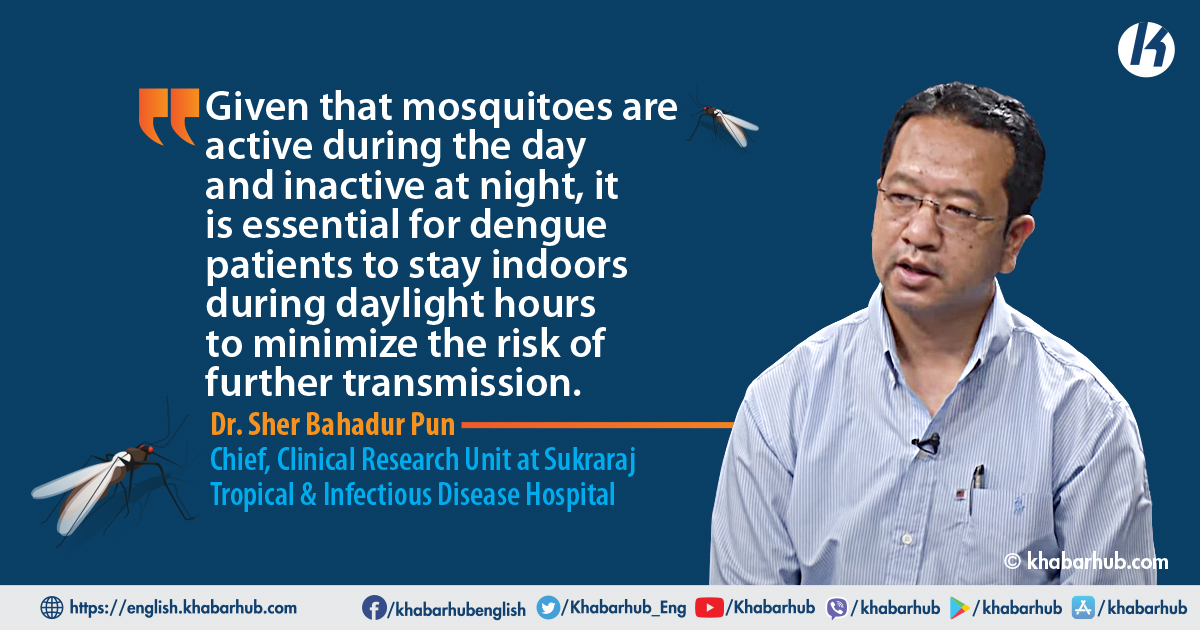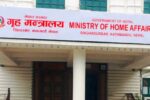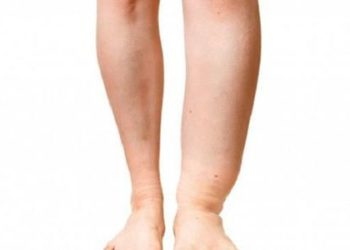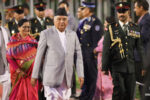KATHMANDU: The number of dengue-infected individuals in Nepal has been increasing, raising concerns about the transmission of this viral fever through mosquito bites.
Dengue is primarily transmitted by female Aedes mosquitoes (Aegypti and Albopictus).
The infection typically presents with a sudden onset of high fever in the early stages, followed by symptoms such as red eyes, pain, headache, stomach discomfort, joint and muscle pain, and lethargy.
One of the critical issues with dengue infection is the decrease in blood pressure due to the loss of water in the blood, which can lead to weakness and fainting among dengue patients.
The country has experienced a significant rise in dengue cases, mainly attributed to mosquito bites.
According to senior communicable disease specialist Dr. Sher Bahadur Pun, Dengue infection poses a serious health concern in Nepal. Early detection and prevention of mosquito breeding sites are essential to curb the spread of this disease. Excerpts of an interview:
How do we understand the dengue infection that is spreading across the country now?
The current spread of dengue infection in the country is a concerning issue.
Dengue is primarily transmitted through the bite of Aedes aegypti and Aedes albopictus mosquitoes, which are most active during the evening and morning hours.
Nepal reported its first dengue cases in 2004, and since then, we have observed a continuous rise in dengue infections.
These mosquitoes, commonly known as “Tiger Mosquitoes” or “Baghe mosquitoes” in English, are responsible for transmitting the virus from one sick person to a healthy individual through their bites.
Given that these mosquitoes are active during the day and inactive at night, it is essential for dengue patients to stay indoors during daylight hours to minimize the risk of further transmission.
The symptoms of dengue infection include high fever, headache, eye pain, back pain, body aches, knee joint pain, skin rashes, loss of appetite, nausea and vomiting, and formation of blood clots on the body, among others.
It’s important to note that dengue symptoms can vary from person to person, and some individuals may experience mild symptoms while others may develop more severe complications.
If someone exhibits these symptoms and suspects dengue infection, they should seek medical attention promptly for proper diagnosis and treatment.
What can people do to prevent dengue infection?
Preventing dengue infection is crucial, and there are several measures that individuals can take to protect themselves.
Since dengue is transmitted through mosquito bites, it’s essential to minimize mosquito breeding and exposure. I would suggest people to take some preventive steps such as wearing clothes with full sleeves or clothing that covers the entire body to reduce exposed skin, avoiding keeping water containers outside, and ensure that water tanks are properly covered to prevent mosquitoes from entering.
Additionally, it is also important to change the water in vases or pots at least twice a week to prevent mosquito larvae from developing, and sleeping under a mosquito net at night.
How should one pay attention to their diet after recovering from dengue infection?
After recovering from dengue infection, a proper diet is essential for a smooth recovery.
It is crucial to focus on consuming foods that can help boost the immune system and aid in regaining strength.
I would suggest people to consume foods rich in Vitamin C and Vitamin D, such as citrus fruits, kiwis, oranges, and sunlight-exposed foods. These vitamins can help in the recovery process.
Likewise, incorporating sources of protein like fish and meat into the diet is also important to help repair tissues and rebuild strength.
Also it is important to ensure that the diet includes a combination of rice, pulses, and fruits to provide a well-rounded and nutritious intake.
By following these dietary guidelines, one can support their body’s healing process and regain energy after dengue infection.
After dengue infection, what kind of treatment can be done at home, and when is it necessary to go to the hospital?
After dengue infection, it’s essential to pay close attention to the symptoms and seek appropriate medical care. Here are some guidelines for treatment:
If mild symptoms like fever and body aches are present, the patient can initially monitor their condition at home. Adequate rest and hydration are crucial during this period.
It’s also essential to follow the doctor’s advice regarding prescribed medications and take them as directed.
In some cases, dengue infection can lead to a significant decrease in white blood cell count, and if this occurs, the patient may require admission to the Intensive Care Unit (ICU) for close monitoring and intensive care.
What steps should be taken after recovering from dengue infection?
After recovering from dengue infection, it is crucial to remain vigilant about any lingering symptoms or new health issues. Here’s what you should do:
If any symptoms persist or new symptoms arise, it is essential to visit the hospital for a thorough examination.
One should also undergo a test and diagnosed promptly to ensure appropriate treatment.
I would also suggest people to take necessary precautions to prevent mosquito bites and avoid the risk of dengue reinfection.
Early detection and proper medical care are vital for a smooth recovery after dengue infection. If anyone experiences any health concerns, it’s best to consult a healthcare professional without delay.









Comment